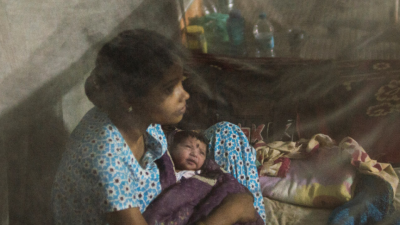
Building Better: The Infrastructure Resilience Overhaul
This blog explores the importance of understanding vulnerability in our critical infrastructure when building resilience to climate change.
This page is approximately a 3 minute read
This page was published on

In Bangladesh, around 6,000 women die each year in pregnancy and childbirth.
In Bangladesh, around 6,000 women die each year in pregnancy and childbirth. Experts believe that at least half of these deaths would be prevented if the women at risk had received adequate medical care.
Sector experts are looking for new methods to identify and support women most at risk. Increased access to digital technologies in Bangladesh has opened up the possibility of adopting AI applications in the healthcare system, helping increase efficiency and save lives.
Findings from the 2021 Lloyd’s Register Foundation World Risk Poll show that people in Bangladesh are generally quite positive about AI, with 43% of the population thinking it will mostly help people in their country in the next 20 years, compared with 23% who said it will mostly harm. This suggests that digital based interventions in maternal care could have a reasonable amount of public acceptance.
"In the implementation of technological solutions, understanding people’s perceptions of risk is crucial for its successful deployment and sustained adoption,” said Dr Olivia Jensen, Lead Scientist for Environment and Climate for The Lloyd’s Register Foundation Institute for the Public Understanding of Risk (IPUR) at the National University of Singapore (NUS). Olivia and her team were invited by The Government of Bangladesh, The Association of Pacific Rim Universities (APRU) and Google to investigate further.
Over the course of the last 12 months, IPUR researchers have gathered inputs from a range of stakeholders in the maternal health sector in Bangladesh, including government officials, doctors, academics, non-governmental and international organisations and conducted a review on the potential benefits and risks of AI adoption in maternal health.
The study, “Mobilizing AI for Maternal Health in Bangladesh”, uncovered a wealth of pilots and initiatives bringing digitalisation and e-services to maternal health – including using mobile phones and other wearable devices for continuous and systematic pregnancy monitoring. However, it also found a number of challenges to effective implementation, including:
Findings from the study were presented to key Bangladeshi government officials, including the Secretary of the Health Services Division, Joint Secretary of A2i - the country’s Digital Transformation Catalyst, policy advisors and directors of relevant arms of the Ministry of Health and Family Welfare.
Policy recommendations following this workshop included extending digital access across Bangladesh with a focus on digital equity between urban and rural populations, establishing standards and protocols for data sharing by public, private and non-profit antenatal care providers, and providing digital training and device access for community health workers. Implementation of these policies could have huge benefits for vulnerable women in Bangladesh.
IPUR’s work in understanding perceptions of risk means that effective interventions can be implemented by policy makers with the needs of vulnerable communities at the heart of decisions. To find out more about how IPUR are making the world a safer and more sustainable place, visit their website.
This project was funded by the United Nations Economic and Social Commission for Asia and the Pacific (UN ESCAP) and APRU as part of the “AI for Social Good” multi-stakeholder network. The network supports policy makers by developing insights on what capabilities and governance frameworks will be most supportive for leveraging AI effectively for social good.